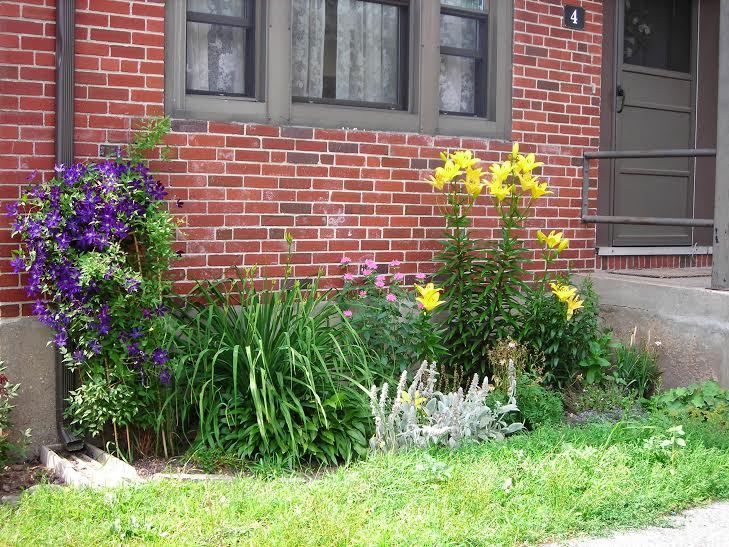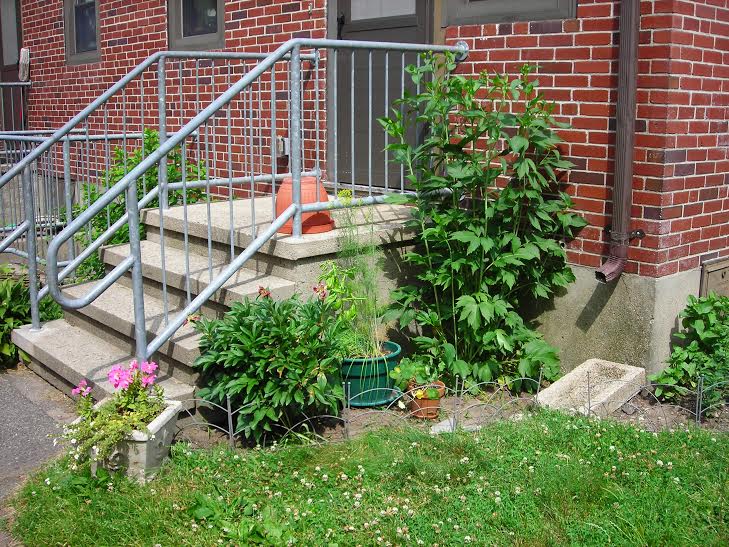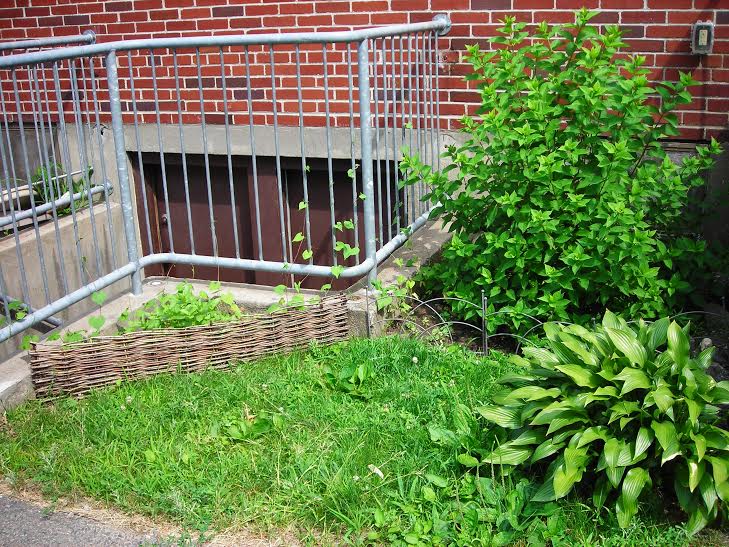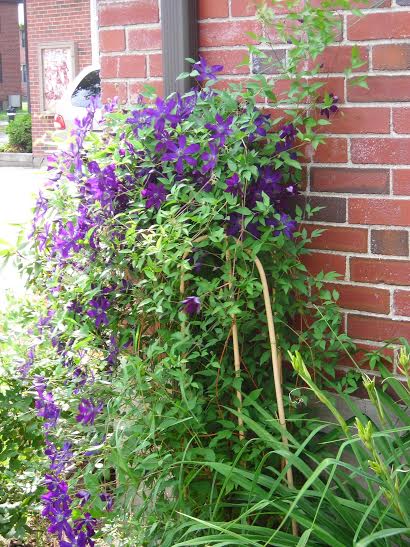Suburban Garden in Boston that Transforms the Community
 In his book Second Nature, A Gardener's Education, Michael Pollan suggests that the reason that Americans are so noticeably disinterested in flower gardening (in comparison with the counterparts in Western Europe and especially Britain where I come from) is due to their veneration of Henry David Thoreau and the influence of his book Walden. It is noticeable how it is not just those with land who grow flowers in Europe, even apartment blocks have window boxes filled with plants outside them and courtyards are routinely filled with planted pots. It is not absent altogether in the US but it is less prevalent. A walk around the suburb in the town of Nashua in New Hampshire where I live will reveal much less careful cultivation for the beauty of it than you would see in its British equivalent. In my experience, the American mindset is one that perceives 'unspoiled' nature and wilderness as the model of beauty, and anything affected by man as unnatural, and therefore less beautiful. The assumption behind this is that man is not 'natural', or modern man at any rate, and so his work with nature is almost automatically detrimental and destructive to some degree.
In his book Second Nature, A Gardener's Education, Michael Pollan suggests that the reason that Americans are so noticeably disinterested in flower gardening (in comparison with the counterparts in Western Europe and especially Britain where I come from) is due to their veneration of Henry David Thoreau and the influence of his book Walden. It is noticeable how it is not just those with land who grow flowers in Europe, even apartment blocks have window boxes filled with plants outside them and courtyards are routinely filled with planted pots. It is not absent altogether in the US but it is less prevalent. A walk around the suburb in the town of Nashua in New Hampshire where I live will reveal much less careful cultivation for the beauty of it than you would see in its British equivalent. In my experience, the American mindset is one that perceives 'unspoiled' nature and wilderness as the model of beauty, and anything affected by man as unnatural, and therefore less beautiful. The assumption behind this is that man is not 'natural', or modern man at any rate, and so his work with nature is almost automatically detrimental and destructive to some degree.
This is not the orthodox Christian view of man and his relationship with the natural world, though I have met orthodox Christians who believe it. As I have described before, man is made to work the land and not only for cultivation for food, but also for beauty. You can read it here in the article, Come out of the Wilderness and into the Garden.
At our very beginning Adam was a gardener in Eden, the risen Christ was mistaken for one and the New Jerusalem our final city dwelling described in the Book of Revelation contains beautiful gardens. In the Song of Songs the lover describes his love as a 'garden enclosed'. The beautiful garden is here used to illustrate the depth and passion of love between man and woman, which is in turn an allegory for the love of God and his Church. Ultimately this points, as all consideration of love does, to Love itself in the mystery of Trinity, whom Augustine characterizes as Lover, Beloved and Love.
In his encyclical on Catholic social teaching Leo XIII stresses the importance of man having access to the land and cultivating it. One surprising consequence of this is to create a fashion among Catholic academics for keeping chickens in their back gardens. Make no mistake, those who wish to do so for whatever reason, are free to do so and if by following this hobby it fulfills that desire to work the land then all the better. But I am not the least tempted to follow suit. I do love to eat chickens, but thank goodness the local and much beloved supermarket chain Market Basket sells eggs year round and has delicious, ready roasted chickens for under $5. This allows me to eat chicken for a fraction of the cost, effort and inconvenience that would be involved if I had a coop in the back garden.
I do accept what Leo says, though and feel that he describes me when he says: 'Men learn to love the very soil that yields in response to the labor of their hands, not only food to eat, but an abundance of good things for themselves and those that are dear to them.' (Rerum Novarum, 47). Where I live now does not have land that I am able to cultivate, but I do not feel so deprived as many might think. I love to go out into farmland walking (as many Brits do) and enjoy seeing the beauty of the land responding to the labor of man's hands. This is something that, again, is much easier to do in Europe where people have much freer access to privately owned land for walking. Also, in accord with the Leo's quotation, I love to grow flowers in the house - growing 'good things for themselves'. This is a passtime with a contemplative end which even my two-year-old enjoys. She delights in the appearance of leaves and flowers in the household plantpots. So much so that we have to make sure in her enthusiasm to look at them she doesn't pull them apart.
I have just returned from a trip to England and as always when I return it makes me feel nostalgia for beautiful countryside and gardens. As a result you are going to see string of articles with photos of Britain in the next month or so. I hope readers will forgive my self indulgence. Also as a reminder to myself that good things are possible in the the US here are some more photographs about a tiny little garden in Boston that has a great impact.
Some readers will remember the wonderful story of my friend Nancy beginning a flower garden in the tiny patch of land available to her in her Boston city home. Here is a low income complex which was changed because she decided to plant flowers. As a result, the neighbours would see her doing this and talk to her and then they started to do the same. The manager of the complex was so pleased in the effect on the beauty of the place and the connections made in the community that she instructed that the common areas be planted too. So she walked the men who mowed the grass around the cul-de-sac and taught them to distinguish between the weeds and unwanted plants, and the flowers which were to be preserved. This act alone runs counter to Thoreau, who said that there was no real difference between weeds and flowers, it was all just in the subjective perception of man. You can read about the story here, How Small Household Flower Gardens Have Helped Transform a Boston Community.
All this and not a chicken in sight (although there is a very good supermarket round the corner selling ready-cooked ones). The photographs below are of Nancy's garden this summer and you can see, if you compare with the photos from the previous article, how the plants have matured very quickly.
I hope we see more of this! I would love to see the status of the profession and passtime of gardening raised once more to the degree that one might confuse Christ for a gardener when we see Him face to face!



